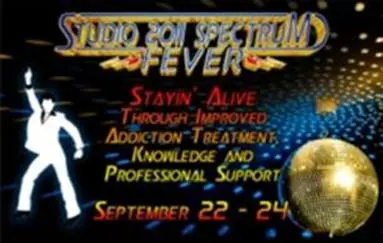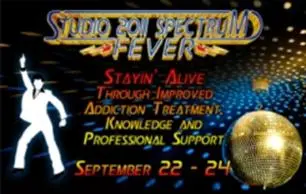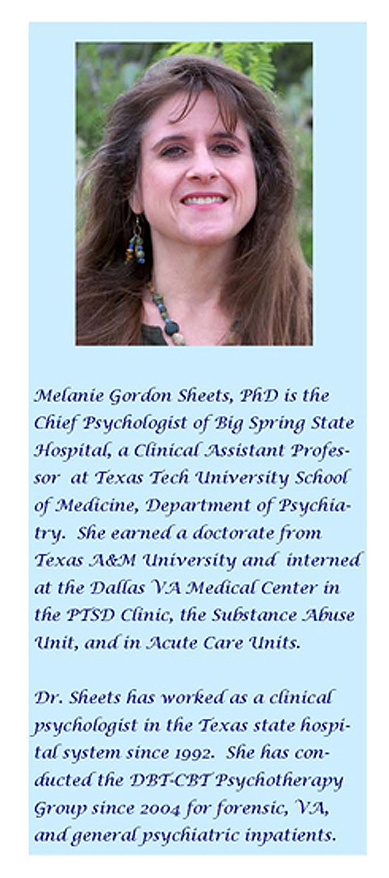Texas Forensic Mental Health Services:
Issues in Treatment, Evaluation, and in the Court
October 25 – 27, 2011
Presented by North Texas State Hospital – Vernon Campus – Vernon, Texas
Wilbarger County Auditorium
Featuring:
Dr. Robert Morgan – “Treating the Mentally Disordered Offender: A Model and Guide for Practice”
Robert D. Morgan completed his Ph.D. in counseling psychology at Oklahoma State University and a postdoctoral fellowship in forensic psychology in the Department of Psychiatry at the University of Missouri-Kansas City School of Medicine and the Missouri Department of Mental Health. He is currently the John G. Skelton, Jr. Regents Endowed Professor in Psychology at Texas Tech University and the Director of forensic services at Lubbock Regional Mental Health Mental Retardation Services. His research has been continuously funded for the past 8 years including by the National Institute of Mental Health and the National Institute of Justice. He is co-author of The clinician’s guide to violence risk assessment (2011) and co-authoring Treating the Mentally Disordered Offender: A Model and Guide for Empirically Supported Practice to be published by Oxford University Press. He is also the Series Editor-in-Chief for Correctional Interventions that Work also to be published by Oxford University Press. His research and scholarly activities include treatment and assessment of mentally disordered offenders, forensic assessment, and professional development and training.
Also Featuring:
Dr. Melanie Gordon Sheets – “A Modified DBT-CBT Recovery Program for a Forensic Population: Treating Individuals with Highly Destructive Coping Behaviors”
Melanie Gordon Sheets, Ph.D. is the Chief Psychologist at Big Spring State Hospital, the Co-Director of the Lone Star Psychology Residency Consortium, and a Clinical Assistant Professor with Texas Tech University School of Medicine, Department of Psychiatry. She earned a Ph.D. in Clinical Psychology from Texas A&M University in College Station, Texas. She has worked with psychiatric inpatients for 25 years and in Texas state mental health facilities since 1992. Specialty areas have included individual and group psychotherapy, psychological assessment (personality, neuropsychological, malingering, and trial competency evaluations) with forensic, VA, and general psychiatric inpatients. She has authored a therapy workbook entitled, “Out-of-Control: A Dialectical Behavior Therapy (DBT) – Cognitive-Behavioral Therapy (CBT) Workbook for Gaining Control of Our Emotions and Emotion-Driven Behavior” – 2009. Recovery Works Publications. She has conducted the DBT-CBT group at Big Spring State Hospital since 2004.
Dr. Stacey Shipley – “Competency to Stand Trial: Forensic Evaluation, Report Writing, & Expert Testimony”
Stacey L. Shipley, Psy.D., completed her doctorate in forensic psychology from California School of Professional Psychology in Fresno, California and obtained her Bachelor’s Degree in Psychology from St. Edward’s University in Austin, Texas with a Minor in Criminal Justice. Her clinical and forensic training has focused on both adults and adolescents, particularly in forensic settings. Dr. Shipley is a licensed psychologist in Texas, Iowa, and North Carolina and is the Director of Psychology at North Texas State Hospital. She specializes in forensic evaluations (e.g., CST, fitness to proceed, insanity, risk assessments, psychopathy classification) and treating maternal filicide offenders. Her professional presentations have included those areas of forensic practice, as well as the relationship between mental illness and violent crime. She has published articles in the International Journal of Offender Therapy and Comparative Criminology, regarding psychopathy and its clinical implications. She has also published chapters on maternal filicide, serial rape and murder typologies, forensic case formulation for adult sex offenders, and co-authored Introduction to Forensic Psychology: Issues and Controversies in Crime and Justice (2nd Ed.) and the upcoming (3rd Ed.) published by Academic Press. She co-authored The Female Homicide Offender: Serial Murder and the Case of Aileen Wuornos (2004) published by Prentice Hall’s Women in Criminal Justice Series.
Additional features and workshops include:
Andrew W. Carruthers, J.D.; Brent A. Carr, J.D.; and Brian D. Shannon, J.D. – “Interface Between the Courts and Forensic Hospitals Judges Panel”
Presentations by a legal scholar, felony and misdemeanor court judges, followed by a panel discussion of the legal experts.
Michele Borynski, Ph.D. & Jennifer Russell, Ph.D. – “Violence Risk Assessment: An Overview for Community & Inpatient Evaluations”
Thomas R. Mareth, M.D. – Chair DSHS Dangerousness Review Board – “Dangerous Review Board Training”
About North Texas State Hospital (excerpted from http://www.dshs.state.tx.us/mhhospitals/northtexassh/ntsh_about.shtm)
History of Wichita Falls State Hospital
“In 1917, the State of Texas created the Northwest Texas Insane Asylum. It was located on 940 acres seven miles south of Wichita Falls…In 1925, the name was changed to Wichita Falls State Hospital (WFSH). It had a modern surgical operating room, radiology, laboratory, electrotherapy apparatus, and hydrotherapy equipment. By 1930, the census was over 1500 patients with a staff of 235, including seven doctors and 93 attendants. During the height of the Depression, the hospital was virtually a self-sustaining community. It had an agricultural enterprise that included farming, hogs, chickens, and cattle. Most of the staff lived on the campus.
By World War II, the hospital consisted of 35 brick buildings and 60 frame structures. Due to wartime shortage of available employees, 234 staff members served approximately 2400 patients. Staff worked six days per week, 12 hours per day. Six nurses rotated coverage at night; three staff members offered occupational therapy. The end of the war saw the total number of employees rise to 503 by the early 1950’s. In 1951, Vernon State Home was activated as a branch of WFSH at the old Victory Field Army Air Corps training field. Vernon served about 400 patients “who do not require an active medical or psychiatric program,” while WFSH continued with a census of 2400. Volunteer programs and charitable donations made life more pleasant for the patients during this period.
In 1955, psychiatric treatment was revolutionized with the introduction of psychotropic medications. Major changes in mental health care continued to occur in the 1960’s. The Texas Department of Mental Health and Mental Retardation was created. New community MHMR centers and outreach programs were established through the state hospital system to better serve the citizens of Texas. The first volunteer services coordinator was hired in 1960, and the first social worker was hired in 1966. Vernon State Hospital (VSH) was established as a state hospital separate from WFSH in 1969. Child and adolescent services were added in the early 1970’s. With more effective medications, increased community services, and placement in nursing homes, the hospital census dropped below 900 by the middle of the decade…
The 1980’s saw the genesis of psychosocial programming and programs such as the client worker program, Fairweather Lodge, and Career Village. These programs profoundly affected the ability of patients to return to their communities. Vernon State Hospital was redefined as the state’s forensic psychiatric facility in 1987; as a result, WFSH’s catchment area grew from 23 counties to 53. By late in the decade, the average census at WFSH had fallen below 500, while the number of admissions and discharges increased. The hospital was more effectively and efficiently treating more people. The end of the decade also saw the introduction of the first atypical antipsychotic drug, Clozaril. Although extremely expensive and wrought with many side effects, it could effect profound improvement in some persons with mental illness.
Another change in Wichita Falls State Hospital’s operation came in 1993 when the responsibility for the substance abuse recovery program was removed from the state hospitals and given to the Texas Commission on Alcohol and Drug Abuse…Concern for healthcare costs and methods lead TDMHMR to explore new and more efficient ways of doing business. As a result of that initiative, TDMHMR initiated the merger of the administrations of Wichita Falls State Hospital and Vernon State Hospital in January 1996.”
History of Vernon State Hospital
The first state psychiatric facility in Vernon, TX, was a geriatric extension of Wichita Falls State Hospital called the Annex. It was first opened in 1951 at Victory Field, the former World War II Army Air Corp pilot training facility south of the city. It served about 400 “senile-type” patients. In 1967, construction of a new psychiatric rehabilitative facility began on 69 acres at the northwest edge of Vernon. In 1969, Vernon State Center began operation as a state hospital serving general psychiatric patients from 30 counties of northern Texas, independent of Wichita Falls State Hospital. It offered inpatient psychiatric services to a predominantly rural population and also operated seven rural-based outreach centers…
In 1971, the Texas Legislature created a statewide treatment facility for drug dependent youth. Because of Vernon’s remote location from the metropolitan drug scene, it was selected to be the site for this new service…Over the years, the adolescent population evolved: From the first years as a drug treatment facility, the need became one to serve teens with a dual diagnosis of drug dependency and a mental illness. The program – serving an average census of 75 patients — was eventually renamed the Adolescent Forensic Program (AFP) because approximately 90% of the patients had, in addition to a dual diagnosis, an involvement with the law enforcement/judicial system.
In 1983, Vernon State Center’s name was changed to Vernon State Hospital (VSH) to maintain continuity throughout the Texas Department of Mental Health and Mental Retardation (TDMHMR) system.
- Persons with felony charges who have been found incompetent to stand trial;
-
Persons admitted for pre-trial evaluations for competency and issues of insanity;
- Persons found not guilty by reason of insanity;
- Persons from other state hospitals who have been found to be manifestly dangerous;
- Mentally retarded persons who have been found incompetent to stand trial on misdemeanor or felony charges;
- Persons from the Texas Department of Criminal Justice (TDCJ) and other jails who need inpatient psychiatric hospitalization. [The hospital has never been asked to fulfill this mandate as TDCJ developed its own psychiatric services.]…
- Persons found not guilty by reason of insanity;
The year 1995 also marked the birth of an initiative between TDMHMR, the Texas Youth Commission (TYC), Vernon State Hospital, the City of Vernon, and the Vernon Business Development Corporation to open a TYC youth boot camp facility at VSH’s South Campus. As a result of the cooperative efforts of all parties, the VSH South Campus (Victory Field facility) was leased to the Texas Youth Commission the following year. The VSH Adolescent Forensic Program transferred to the VSH North Campus in September 1996, moving into four renovated buildings on the south side of the Maximum Security Program. The move necessitated an $8.5 million construction project, resulting in the building of the Mooney Building, which houses the adult Behavior Management and Treatment Program, and the Heatly Building, a new adolescent activity building. It also necessitated additions to the administrative complex, new fencing, and other renovations. By the late fall of 1997, the adult maximum security and adolescent forensic programs were fully operational at one campus location.
In January 1996, TDMHMR combined the administrations of Vernon State Hospital and Wichita Falls State Hospital under the leadership of James E. Smith, Superintendent. This initiative was in answer to the ever-pressing need to provide the citizens of Texas with more effective and more cost-efficient mental health care. Consolidation of the two hospitals became official on September 1, 1998, under the temporary name Vernon-Wichita Falls State Hospital. Nine months later, the 76th Legislature formally renamed the organization North Texas State Hospital, retaining the location names – Vernon campus and Wichita Falls campus – to designate the individual sites.
The Vernon campus of North Texas State Hospital has a history of offering exceptional mental health care to the various groups of patients entrusted to its care and plans to continue to offer the best care available to the specialized populations of patients who are now in its charge. Throughout the years, it has maintained Joint Commission on Accreditation of Healthcare Organizations accreditation as well as a reputation for “country care.” It has become nationally recognized as a benchmark in the forensic mental health care field.
History of North Texas State Hospital
After two and a half years of intensive planning and incremental consolidation, Vernon and Wichita Falls State Hospitals officially became a single mental health care organization on September 1, 1998…the state legislature formally renamed the “new” organization North Texas State Hospital (NTSH).
Today North Texas State Hospital operates two sites 55 miles apart in north Texas. The Vernon campus provides forensic services for the entire state of Texas and offers both a 284-bed Maximum Security Program for adults and a 78-bed Adolescent Forensic Program for dually diagnosed youth ages 13-17. The Wichita Falls campus provides general psychiatric inpatient services for child, adolescent, adult, and geriatric patients with a bed capacity of 330.
Together, the two campuses of the organization comprise the largest state hospital in Texas.
Last updated April 08, 2011″










